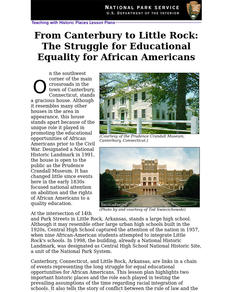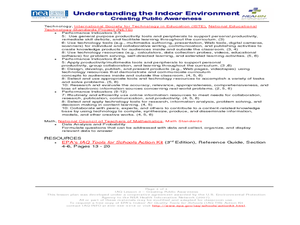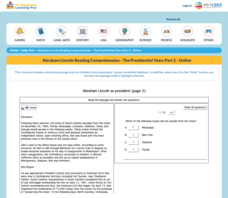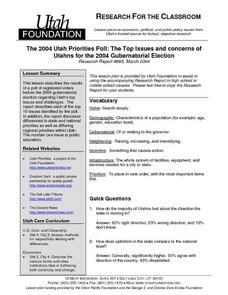Curated OER
Near v. Minnesota
Students discuss what free press means and what it would be like without this right. They read the summary from the Near v. Minnesota case. In groups, they analyze a problem and report to the class.
West Virginia Department of Education
Oral Health Education Resource Kit
Brushing, flossing, a healthy diet, and personal hygiene are keys to good oral health and the information, the activities, and the experiments included in this packet will go a long way toward encouraging your class members to develop...
C.S. Lewis Foundation
Educator’s Guide to The Lion, The Witch and the Wardrobe #2
This chapter-by-chapter guide to The Lion, The Witch and the Wardrobe, designed to be used in either a classroom or homeschool setting, contains vocabulary lists, discussion questions, and writing prompts.
Center for History and New Media
The Daily Experience of the Laurel Grove School, 1925
What was daily life like for those attending segregated schools in 1925? Modern learners fill out a KWHL chart as they explore historical background and primary source documents about the Laurel Grove School in Fairfax County, Virginia....
Curated OER
Free African-Americans in Delaware
Students work in groups of two and review the Abolitionist Movement. They observe the manumission/city directory and discover what it is and why it is so important. They read the manumission aloud and discuss why they were freeing their...
Curated OER
From Canterbury to Little Rock: The Struggle for Educational Equality for African Americans
Students explain the magnitude of the struggle involved in securing equal educational opportunities for African Americans. They examine how Prudence Crandall challenged the prevailing attitude toward educating African Americans
Curated OER
Introduction to Poetry Lesson Plan
Analyze poetry in a group setting. Middle and high schoolers read lyrics to a Tom Petty song and free write about the song's tone, setting, and speaker. They then complete the same activity in a group setting using seven poems. The...
American Chemical Society
Norbert Rillieux, Thermodynamics and Chemical Engineering
The man who invented the earliest examples of chemical engineering was an American-born, French-educated, free man of color before the Civil War, and went on to translate Egyptian hieroglyphics. There is something of interest for almost...
Federal Reserve Bank
Your Credit Report
What is your credit score? How do you find it? Help your pupils answer these questions and more. They will access their free credit report and then analyze its meaning.
Prestwick House
I Am Malala
I Am Malala: The Girl Who Stood Up for Education and Was Shot by the Taliban by Christina Lamb and Malala Yousafzai is an inspirational tale of heroism through adversity. Focus on the key details of the book with a quick review crossword...
Curated OER
Feature Column: Virtual Field Trips
Young scholars discover ways to stay healthy by utilizing Internet education software. In this computer technology lesson, students investigate Internet programs that simulate a field trip by showing images and video. Young scholars...
Curated OER
Creating Public Awareness - Indoor Air Quality
Students design a poster about indoor air quality. In this indoor air quality lesson, students make a billboard that tells the occupants of a building about at least one air quality problem.
Curated OER
Helping Homeschoolers Be College-Ready
Advice on essential skills for college from a homeschooled, public school teacher.
Mr. Nussbaum
Abraham Lincoln Reading Comprehension—The Middle Years (Part 3)
How did Abraham Lincoln begin to change the minds of American citizens? Join him in his quest with a reading passage about Lincoln's experiences as a congressman and public denouncement of slavery. The resource contains reading...
Curated OER
America's Future Culture
Seventh graders research the past and present policies in the United States regarding immigration. As a class, they read "Immigration Timeline" to examine the various groups who came to America for a better life. To end the lesson,...
Curated OER
A Free and Open Press: Evaluating the Media
Students compare and critically evaluate the different media as sources of news, develop criteria for defining "news", experience the editorial process of selecting news stories and detect bias in news reporting.
Mr. Nussbaum
Abraham Lincoln Reading Comprehension—The Presidential Years (Part 2)
How does a president save a country from itself? Readers learn how the Civil War began and how Lincoln managed it with a reading comprehension passage. They then demonstrate their understanding with multiple choice questions that...
Curated OER
How and Why to Look at Abstract Painting - Activity 1
Students create abstract art using acrylic paints and canvas in this lesson provided by Oregon Public Broadcasting. The lesson includes information on abstract art and video links.
Curated OER
The 2004 Utah Priorities Poll
Students participate in a lesson that focuses on a state survey for Utah. The survey is intended to find the public opinion of how the state is doing in the public eye. They analyze the survey and create their own to research the status...
Curated OER
Parents are unawareof Ecstasy risk:Anti-drug Education
Students read an article on parents unawareness of Ecstasy use. In this current events lesson, students infer issues related to teen drug use and parent prevention and engage in a class discussion. Students give a quiz related to Ecstasy...
Curated OER
Ecosystem Lesson Plan: Food Chain/Food Web
Students discuss ecosystems, eliciting their current knowledge of an ecosystem. Students receive an Ecosystems document and look at the picture. Students brainstorm connection between the cover picture and ecosystems. The indicated...
Library of Congress
Uncle Tom’s Cabin and the Fugitive Slave Act
From the time of its publication, Uncle Tom's Cabin has been controversial. To better understand the debate, class members first examine a broadside decrying the Fugitive Slave Act of 1850, and then two newspaper reviews of the novel...
1 plus 1 plus 1 equals 1
I Can Read! Sight Words Set #8
Provide the building blocks to a strong education with a packet about sight words. Kids work on the words little, we, do, and all with tracing and matching activities, as well as games and flash cards.
1 plus 1 plus 1 equals 1
I Can Read! Sight Words Set #14
Study the sight words but, have, will, and into with a series of reading activities. With tracing lessons, matching games, and flash cards, the packet is a great first step to a successful reading education.







